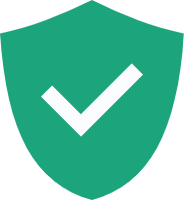Should My Domain Name Match My Business Name?
Ideally, your domain name should either match your business name or complement it somehow. So when you’re ready to secure your domain name, choose one that’s short, memorable, and on brand for business. Here’s how.
Business Name Vs Domain Name
Your business name is the legally recognized name of your company. This is the name that appears on your Articles of Organization or Incorporation when you form a business. Many businesses operate under their legal business name—some use Doing Business As (DBA) Names to use other names. Your business name will need to meet a few requirements that are outlined in your state’s statutes—the big thing to remember is that it needs to be unique in your state.
A domain name, on the other hand, is a unique name that acts as an address for your website in lieu of a numerical IP address. This name should be memorable enough for visitors to remember, and it will also help establish your brand online. In the same way that your physical address guides visitors to your business, your domain name guides them to your online home. There isn’t a legal requirement for matching your business name to your domain name, or vice versa. This is great, since it allows you to choose any domain name that suits your business needs, with just a few caveats outlined below.
Which Comes First: LLC or Domain?
Deciding whether you should register a domain or form an LLC first depends on your business’s specific circumstances and priorities. There’s no cut-and-dry answer to this question, but we can help you figure out which step makes the most sense for your business to take first.
Register a Domain Name First If:
Your desired business name is available as a domain name.
Domain names are limited, so registering your unique business name is the best way to make sure you don’t miss out on your ideal domain. Do a preliminary check to make sure it’s available in your state, too.
You’re not quite ready to form an LLC.
If you have an idea but haven’t started the legal paperwork to form your business, registering your domain can keep it safe while you file.
You’re ready to start building an online presence.
Rome wasn’t built in a day, but you can lay the framework for your online presence by registering a domain before you ever hammer out website details.
Form an LLC First If:
You need liability protection for your business right away.
You may be responsible for business debts or legal issues as an individual if you operate the business online prior to legally forming it. LLC formation can limit your liability from day one.
You’re seeking special tax benefits.
Default pass-through taxation allows LLC members to claim business profits on their personal taxes instead of taxing profits on the business and personal level.
You want to legitimize your business online and offline.
Many consumers recognize formally registered businesses as more trustworthy since they must comply with state regulations and best practices.
Ready to form your LLC first? Hire us to file your LLC for you and we’ll give you a business domain name free for 1 year.
Where Business And Domain Names Align
While you’re free to choose any domain name regardless of the business name you’re operating under, there are some situations where it makes sense to match your domain and business name as closely as possible:
- Maintaining consistency in your branding and messaging.
- Using your exact business name as a domain can help create a consistent and identifiable brand across websites and social media profiles. The exact spelling and consistency also provides a layer of protection by establishing your business online to prevent others from creating websites using your business name.
- Tying your online presence to your established business reputation.
- By matching your domain to the legal business name that you operate under, visitors can easily find your website and connect your online dealings to your physical business. This allows them to find information tied to your business lends instant credibility to your website through established social proof like customer reviews.
- Optimizing search engine results for your business.
- Search Engine Optimization (SEO) results are driven by keywords. When users search for discount restaurant depots, exact name matches appear higher in search results, so choosing an exact match for a business name like discountrestaurantdepot.com for your business named Discount Restaurant Depot LLC can help give your website a boost.
When can you avoid an exact domain name match?
It’s easy to see the benefits of matching your business and domain names. Likewise, there are some circumstances where your domain name may deviate slightly from your business name. Here are a few reasons why you might switch things up:
- Shortening a lengthy business name to make it more memorable.
- Most domain names are 2-3 words In length, with many being under 15 characters. Longer business names can be less effective when marketing online, so choosing a shorter domain like jennysteacafe.com instead of Jenny’s English Tea & French Pastry Cafe LLC makes it easier for visitors to find your website.
- Deliberately choosing a branding angle for your business.
- Some businesses opt for a domain that doesn’t match their business name for marketing reasons. For example, a dentist might register wefixteeth.com instead of their personal or practice name. Or they might register this domain alongside an exact match with the intent to forward visitors to their primary site from a catchier sounding domain.
- Proactively limiting confusion with existing domains.
- It’s not uncommon for established brands to register similar domains and redirect them to their brand. This is usually a solution for commonly misspelled domains or similar domains that visitors often mistake for their intended domain. Directing visitors to the correct domain avoids costly mix-ups for visitors and hits to the brand’s good reputation.
What if My LLC Name Isn’t Available as a Domain?
You’ve taken all the steps to formally register your business, only to find that your ideal domain isn’t available. Don’t worry, you still have options! Try these solutions:
Try a unique TLD.
If your business name is not available as a domain name, you can choose variations that include a different TLD (Top level domain). You may be familiar with the top four domain extensions — such as .com, .co, .org, and .net — but there are hundreds of industry and product specific domain extensions available to choose from.
For example: www.yourcoffeetogo.com > www.yourcoffeetogo.biz
Add an abbreviation.
If you can’t register your exact business name, you can try adding in an abbreviation or numerical value that gets the point across while still maintaining your brand name. This allows you to use the closest available match to your legal business name while having the added benefit of a more popular domain extension.
For example: www.yourcoffeetogo.com > www.urcoffee2go.com
Buy a registered domain.
If you’re dead set on a domain and no other domain will do, reach out to the current domain holder to see whether they will sell it to you. While this isn’t an ideal solution, it’s a viable way to secure the domain of your dreams. Search the WHOIS database to find out who the current domain owner is, along with how to contact them with inquiries.
How Does Registering A Domain Protect My Business?

Preserving your reputation.
Your online presence can push your branding further, but your reputation can be damaged when similarly named businesses and misleading domain names pop up in your market. By securing your domain, you can keep it unavailable to others who may try to use your branding for their gain.

Discouraging financial loss.
Your brand depends on sales and sign-ups to thrive, so it’s important to direct your customers to the right place. It’s possible to miss out when clients are directed to similarly named products. Cut down on these lost sales by securing a domain and directing visitors to your existing social media profiles and professional email address, even if you don’t have plans to build a website.

Protecting your privacy.
Your information is made available in a database of registered domains, which can be publicly accessed online. By registering your domain through Registered Agents Inc, you’re able to use our contact details to keep your personal address and information in safe hands. We’ll never sell it.

How Do I Get Started?
Search for your domain name and sign up today. We’ll provide all the tools needed to register your domain and build your website with no experience necessary.
Not ready to build a site? We’ll help park your domain and forward visitors to another spot on the web so you don’t miss out on important traffic.

